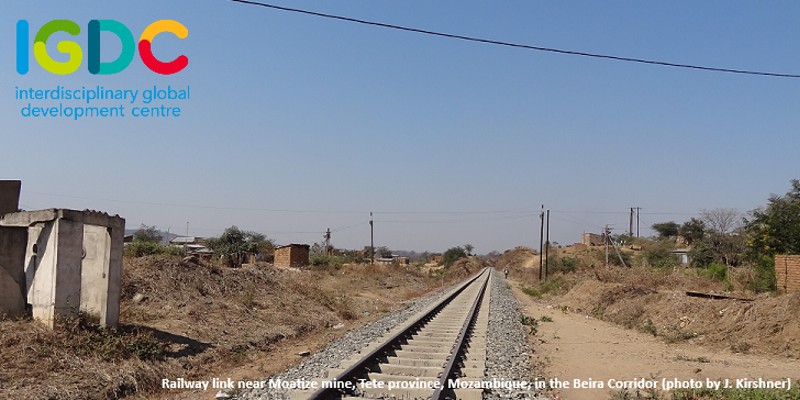
Empty signifiers: New approaches to discourse analysis in infrastructure
This event has now finished.
Event details
Interdisciplinary Global Development Centre (IGDC) webinar
Speakers: Ed Aktins (Bristol University), Aurora Ganz (Queen Mary University of London) and Joshua Kirshner (University of York), with discussion with Barnaby Dye (University of York), convened by Joshua Kirshner
Summary: What can critical discourse analysis, as both a method and conceptual approach, reveal in research into the development of connective infrastructures (roads, railways, ICT networks), past and present? The panel will examine the theoretical and political implications of these questions through the notion of an ‘empty signifier’: a free-floating container of multiple meanings, histories, and practices.
About this event: In this IGDC webinar will consider how the study of connective infrastructures, past and present – e.g., roads, railways, pipelines, oil drills, buildings, TV stations – can be enriched by the theoretical lens of Ernesto Laclau and Chantal Mouffe. The speakers will reflect on the framing of such large-scale projects as ‘empty signifiers’, in whose interests this is done, for what purposes, and what insights a critical discourse analysis approach may reveal. Through detailed engagement with Laclau and Mouffe’s work, we will explore examples of materialist discourse analysis applied to infrastructural developments in places ranging from Azerbaijan, Mozambique, and the UK.
The panel will examine the theoretical and political implications of these questions through the notion of an ‘empty signifier’: a free-floating container of multiple meanings, histories, and practices. The concept makes it possible to explain how certain words or phrases acquire political importance, and how ongoing political struggles seek to establish the definition of certain terms, giving them relevance for social processes. As claims for their economic necessity and appropriateness ebb and flow, such infrastructures can harbour different meanings to different actors, helpfully organising their conflicting interests and concerns, while pointing to a desired future of progress, connectivity and security that may support some but exclude others. The sites and projects we will examine are located in different settings but share common features as powerful imaginary spaces for advancing disparate – and even conflicting – political projects and specific configurations of government and state-society relations. Tracing their discursive framing can reveal much about such imaginations, their traction and staying power, along with the spaces for political intervention and resistance that they offer.
Based on new work, Ed Aktins (Bristol University) will trace the narratives pushed in an emergent, peripheral but powerful right-wing media source in the UK: GB News. Through an analysis of programming in 2023 on two cases of climate and action (namely ULEZ in London and Just Stop Oil protests), he highlights the emergence of certain objects as key symbols in the formation of antagonist identities. From gas stoves to orange paint and white Ford Transits, numerous symbols emerge in attempts to constitute a new working-class anti-environmentalism. These items, previously banal and everyday, are presented by far-right media as linking associating working-class communities with resistance against perceived climate alarmism.
Aurora Ganz (Queen Mary University, London) will discuss how collective emotions are ontologically bound to the securitisation of energy while putting forward an innovative method that engages materiality and discourse in securitisation theory (ST). Aurora will present findings based on research conducted in Azerbaijan, where she explored how collective pride is anchored to materialisations and reiterative identity discourses that stick to energy sites and align with the nation in ways that fit with the coercive and controlling nature of securitisation. Curious to understand how things assemble with human emotions in the process of energy securitisation, Aurora’s work focused on energy objects (e.g., oil and gas and their derivatives, electricity, pipelines, pumps, onshore and offshore drills), security technologies (e.g., weapons, CCTV cameras, sensors, radar and drones) and architecture (e.g. statues, buildings).
Presenting a recent paper co-authored with Idalina Baptista (Oxford University), Josh Kirshner (University of York) will explore the use of development corridors as a framing concept/construct in the Indian Ocean nation of Mozambique. He will examine the continuities between the three contemporary Mozambican corridors and older colonial transitways that connected the three cities to British colonial interests in southern Africa.
Then, drawing on Laclau and Mouffe’s discourse analysis, he will suggest that corridors can serve as empty signifiers, becoming linked to various, often diverse understandings, standing for fluid yet enduring ambitions of connectivity, competitiveness, and regional integration. Accordingly, elites, investors and donors have presented corridors as technical, apolitical projects, built in the interest of social and economic development, irrespective of their success in delivering benefits to local communities. After scrutinising recent investments in the three corridors, he will reflect on their role in the construction of a ‘new’ Mozambican economic order that is nevertheless deeply entangled in the country’s past.
